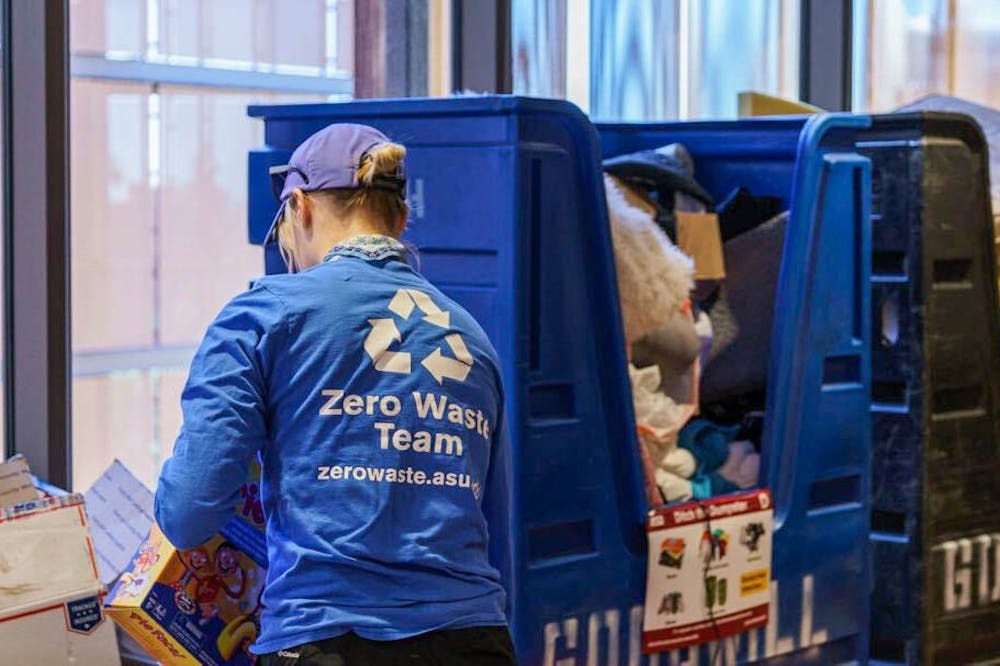ASU’s Zero Waste department is a team of seven working with the aim of making the University zero waste by 2025, providing ASU with a holistic approach to waste management through promoting proper refusal, reduction and recycling of waste.
To achieve this goal, the Zero Waste department has implemented recycling and composting programs that aid the community in proper disposal of materials in an environmentally conscious manner. Generally, zero waste refers to the effort to divert waste from landfills and to ethically reduce volume and toxicity of waste.
"Our role is to guide and inform the University’s strategy toward zero waste and advise stakeholders who have scope of authority over their space," said Kendon Jung, a program manager within the Zero Waste department who oversees marketing and communications.
There are two main components within the department: a heavy operations team and an engagement team. The heavy operations team oversees the day-to-day operations, such as compost and recycling collection. The engagement team deals in large-scale projects and consults on how to reduce waste, including special events like Green Games.
Zero Waste oversees waste management across ASU’s campuses along with specialty collection sites on each campus that the operation team services.
Waste collection includes compost, hard-to-recycle items, bulk cardboard and soft plastics. The collected wastes are put into a centralization point where a vendor will pick it up or the team will take to the vendor.
Vendors chosen by the Zero Waste department must be certified in the industry best standard for material management. This certification ensures that recycled waste is not being sent to places like an incineration factory.
Republic Services is ASU’s waste disposal service provider. It is one of the University's larger contracts and emphasizes sustainable disposal practices including recycling and composting, Gaude said.
"We have a pretty good line of communication with Republic (Services), especially to ensure that our key streams for supporting our diversity, recycling and compost," Kelsey Guade, program manager of services at Zero Waste, said. "We're actually diverting the material and then we have a constant update on how much is being diverted and if there's any contamination as for compost specifically."
Jung said although ASU initially had over 30 waste management contracts for different spaces on campus, the department was able to create a singular contract in 2007 to ensure a sustainable waste management system for the entirety of the University.
Having everything under one contract made it simpler for the team to track waste disposal and create goals from their observations.
"We look at where the waste is being generated from and work with those stakeholders in order to shift their behaviors, and then to align the operations behind whatever the stakeholder needs in order to make that become a reality," Jung said.
A staple of the department are the zero waste bins that can be found across campuses. The bins are strategically placed and color-coded to ensure students consuming a variety of materials can have the same experience no matter where they are on campus.
"Diversification in materials'' and "behavior" are factors that challenge the department’s goal of zero waste by 2025, said Jung. With the large number of people who come to ASU campuses who each have their own patterned consumption of materials, it's a challenge to filtrate waste to its proper disposal sites.
Zero Waste's most recent annual report in 2021 showed that the University diverts waste from landfills at a rate of 41.3%, with the department hoping to see the number closer to 90% by 2025. According to Gaude, a primary setback for the team was the COVID-19 pandemic limiting their ability to push Zero Waste's message and establish programs that would assist in achieving this goal.
Although it will be a challenge for ASU to be zero waste by 2025 according to Jung, the ASU community can help achieve this goal through conscious waste and consumption decision making. Aligning individual habits over time by recycling and composting will leave a more impactful footprint that can be followed by others.
"When the community at large within the ASU population is making decisions to reduce waste, the impact is very large," Guade said.
Jamie Lee-Ramirez, a criminology and criminal justice major, said initiatives like the Zero Waste department’s are necessary because there is a need for more public knowledge, especially in Arizona, about recycling.
"It's interesting because I'm from Los Angeles, and we recycle everything. I grew up recycling, so coming here where people don't know what goes into a blue bin was a little weird to me," Lee-Ramirez said.
Edited by Sadie Buggle, Greta Forslund and Caera Learmonth.
Reach the reporter at clegallo@asu.edu and follow @claire_legallo on Twitter
Like The State Press on Facebook and follow @statepress on Twitter.

Claire Le Gallo is a reporter for the Community and Culture desk at The State Press. She is a sophomore majoring in Journalism and Anthropology.




